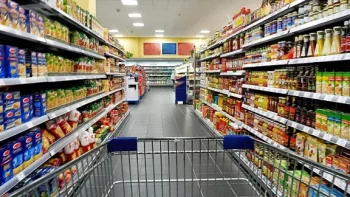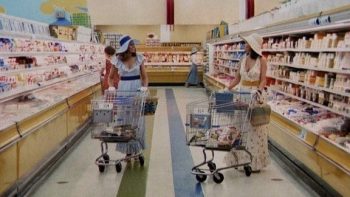All those who have never set foot in a hypermarket do not know the social reality of today’s France. The hypermarket as a great human meeting place, as a show.
Annie Ernaux, Look at the lights my love
Analyzing the supermarket as a witness to a society may seem superficial, and yet, nothing could be more fascinating! This space has shaped and still shapes our socio-geographical environment. As the embodiment of consumerism and individualism, it is, paradoxically as it may be, a hotbed of socialization.
But how to consider such a thing between cans of tuna and chocolate bars?
The supermarket, “Babylonian temple of the Merchandise”
Two doors open, shopping cart in hand, here we are in the temple of the 21st century: the supermarket. The accumulation of products of all kinds sucks our appetite, and drowns us in a massive and dehumanized standardization. “We are fascinated by this Babylonian temple of Merchandise” ( Le Bruissement de la langue , Roland Barthes).
This fascination is transformed into real impulses of purchases and engulfment. This compulsion maintains a system of consumption for consumption. The alienation from consumption therefore makes the supermarket an all-powerful one against which it is difficult to fight. Especially when you are a small trader and/or local producer.

To be anonymously universal?
From the post-war period, the supermarket becomes the place of the incarnation of a class, a genre, and not just any; that of the American Way of Life. Standardization of the customer, the product, the seller and the buying ritual. The anonymity of the supermarket alienates any form of individuality, and what to say with the appearance of automatic checkouts…
Yet there is in this depersonalization a form of universality of the model, in the West at least, the supermarket takes the form of a “hyperplace” (Michel Lussault): concentrated globalization where space accommodates all scales by confronting . In this high degree of universality (products from all over the world in a supermarket), we observe a sort of universal language, of common benchmarks, those of consumption, of course, but which make it possible to forge a common social experience.

Fascination for the supermarket
The fascination that the supermarket can arouse gives it a special value. In Jerzy Skolimowski’s film Moonlighting , four Polish workers go to London to work for their boss. They discover a supermarket in London. When they return, they are almost moved by the “spectacle”; shelves filled with food and wine, this abundance becomes a symbol of a prosperous economic model, of a rich and pleasant life.
The same goes for Bigelow’s Démineurs ; the montage softens and soothes the images of soldiers on the Iraqi battlefield with an American doing his shopping, walking past the refrigerators of a supermarket. The supermarket then became the incarnation of a sort of haven of abundance and wealth in which one feels somewhat sheltered.
A new social place, a new commercial café
The supermarket can become a place in which we “belong to society”, in the same way as a bistro or a commercial café allowed (at least in France). Thus in the supermarket all types of individuals meet; regardless of age, tax income, cultural capital, look, …
The supermarket is perhaps the least socio-geographically segregated space. The supermarket bears witness to the fashions, genres and classes of an entire society of which it is the playground.
Many encounters take place in the anonymity of supermarkets; run into a neighbor or bump into an old friend. All this contributes to the socialization of man in a place that could not be more popular. We do not expect to come across a mafia godfather or a movie star in the delicatessen department. The supermarket is therefore a place of popular socialization which participates in the experience of space throughout life.

The grocery store ; “a microcosm within a macrocosm”
At the same time very popular just like a Gallic village (with the butcher’s stand, the bakery stand, pastry shop, Asia, where people find themselves by chance) and at the same time the embodiment of globalization and standardization. The supermarket as a popular place is also understandable insofar as inflation and other political and economic problems affect the purchasing power of households. The first expenses are always (or almost) at the supermarket…
It is therefore the place to witness the evolution of society and its people.
